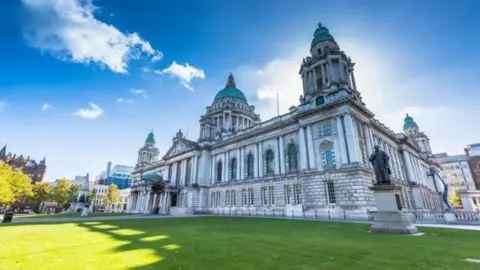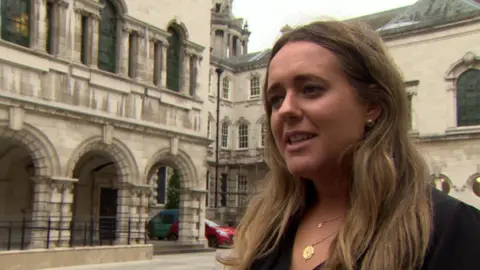Belfast City Council reviews impact of holiday rental websites
 AFP
AFPBelfast City Council is reviewing the effect of holiday rental websites such as Airbnb.
Figures seen by the BBC suggest a 40% increase in the number of Airbnb and HomeAway bookings in Northern Ireland from May last year to May this year.
The data comes from Airdna, an organisation that collects information on both of the digital platforms.
Airbnb claims figures from third party organisations can be misleading and inaccurate.
Airdna said it "scrapes property and reservation data from all 10 million listings on Airbnb and HomeAway to put together reports".
It said its "metrics are the most accurate in the sector" and are independently verified by the property services firm CBRE to be "within a 5% margin of error across the board".

One Belfast councillor has said the need for affordable housing must be considered alongside the growth of holiday rental properties.
The rise of online hospitality platforms has left many in Europe concerned about the effect on communities.
In June, 10 European cities wrote to the EU asking for help to fight the expansion of holiday rental websites.

Kate Nicholl, an Alliance Party councillor for south Belfast, said "there's a demand for housing in our city that we can't ignore".
Speaking about the growth of Airbnb and other similar platforms, she said there are positives and negatives but she thought a review was overdue.
She said she was "interested in looking at measures to cap them".
"It's all happened so rapidly we need to make sure that how we deal with and how we approach it is carefully considered," she said.
"You can lose that sense of community and cohesion in some areas."
Restrictions on short-term rentals are nothing new. Cities from Berlin to Toyko have been taking action for several years.
The reality is that the rise in rental bookings is directly linked to increasing numbers of visitors.
 Getty Images
Getty ImagesTourism is big business, with the industry expected to be worth £1bn to Northern Ireland by 2020.
Dr Peter Bolan, Ulster University's director of international travel and tourism management, said "tourism is absolutely huge in Northern Ireland".
"No-one would have thought 20 or 30 years ago that we would be at this point," he said.
"In many ways we are punching above our weight for a country the size of Northern Ireland in terms of the economic impact that tourism is having and the job growth and how it's portraying our image globally.
"We still have a lot of room for growth but we do have to be careful that we spread the impact, both in terms of where people go and what they do."

Airbnb said it "is built on the principles of making communities stronger and spreading tourism benefits to local families and businesses".
"We want to be a good partner to the places in which our hosts live and have long led the industry in developing clear home sharing rules and promoting healthy tourism," it added.
HomeAway said it takes its responsibility of "keeping the balance" between offering holiday homes and its effect on communities "very seriously".
"HomeAway provide undeniable benefits to communities by generating revenue for local families," it added.

Experts have said the possibility of damage to communities is real.
Housing expert Prof Paddy Gray said it was "hollowing out communities".
"You have tourists being imported into areas as temporary residents and in some cases it's causing tension," he said.
"It can also force people out because obviously rents can go up because landlords want to use their property as an investment with Airbnb because it can be a lot more lucrative."
Northern Ireland may be far behind other European countries when it comes to tourism but with the boost from Game of Thrones - which was largely filmed in the region - and a growing interest in Troubles-related conflict tourism the sector looks set to keep expanding.
